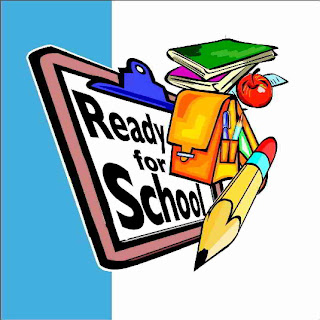Sunday, August 26, 2012
Sunday, August 19, 2012
Give Stress a Rest
Aerobic Activity
Posted by Unknown at 2:00 PM 0 comments
Labels: Exercise, tips for family health, Tips for parents
Saturday, August 18, 2012
RESPONSIBILITY
Posted by Unknown at 2:00 PM 0 comments
Labels: How to Get the Best Education Possible for Your Child, responsibility, Tips for parents
Friday, August 17, 2012
The Joy of Teaching
Posted by Unknown at 2:00 PM 0 comments
Thursday, August 16, 2012
Posted by Unknown at 2:00 PM 0 comments
Labels: How to Get the Best Education Possible for Your Child, Tips for parents
Wednesday, August 15, 2012
Healthy Meals and Snacks
Morning Starters:
1. Oatmeal made with skim milk and raisins
2. Frozen waffles with frozen berries and walnuts
3. String cheese with a piece of fruit and wheat crackers
4. Scrambled eggs with low-fat cheese wrapped in a tortilla
5. Hummus with celery sticks and wheat pita
6. Toasted English muffin with tomato sauce and cheese
7. Fruit smoothie with frozen fruit and yogurt
Afternoon Snack
1. Fresh whole fruit
2. Low-fat string cheese
3. Prepackaged fruit cup in fruit juice or water
4. Homemade trail mix
5. Carrot/celery sticks with low-fat ranch
6. Oatmeal-raisin cookie
Evening Snack
1. Small bowl of cereal with skim milk
2. Plain yogurt with honey and sunflowers
3. Cottage cheese with pineapples
4. Hot chocolate made with skim milk
5. Slice of wheat toast with nut butter
6. 1 cup of air-popped corn sprinkled with Parmesan cheese
Posted by Unknown at 2:00 PM 0 comments
Labels: nutrition, tips for family health, Tips for parents
Back to School Simple and Stress-Free: Part 5
By GreatSchools Staff
Posted by Unknown at 2:00 PM 1 comments
Labels: How to Get the Best Education Possible for Your Child, start of school, Tips for parents
Tuesday, August 14, 2012
A Gift of Forgiveness
Posted by Unknown at 6:13 PM 0 comments
Labels: tips for family health, Tips for parents
Saturday, August 11, 2012
Fitness and Your Child
Posted by Unknown at 2:00 PM 0 comments
Labels: fitness, Health and the family, Tips for parents
Thursday, August 9, 2012
Back to School Simple and Stress-Free: Part 4
Posted by Unknown at 2:00 PM 0 comments
Labels: How to Get the Best Education Possible for Your Child, start of school, Tips for parents
Wednesday, August 8, 2012
Back to School Simple and Stress-Free: Part 3
Posted by Unknown at 2:00 PM 0 comments
Labels: How to Get the Best Education Possible for Your Child, start of school, Tips for parents
Tuesday, August 7, 2012
Back to School Simple and Stress-Free: Part 2
By GreatSchools Staff
As the lazy days of summer slip away, it will soon be time to put away the beach chairs and corner lemonade stands and prepare for going back to school. Here are some tips to make the transition easier.
Posted by Unknown at 2:00 PM 0 comments
Labels: How to Get the Best Education Possible for Your Child, start of school, Tips for parents
Monday, August 6, 2012
Back to School Simple and Stress-Free: Part 1
By GreatSchools Staff
2. Get organized
Take advantage of the slower pace during your time away from school to set up for the busy school year ahead.
•Many schools send out school information and a packet of forms to fill out before school starts. If you can discipline yourself to fill out the paperwork several days before it's due, you'll avoid a last-minute panic.
•Have the necessary immunization records available for easy reference.
•Update school emergency contact and health information for the coming year.
•As you read through all the school information, mark important dates (such as back-to-school night, parent-teacher conferences and school holidays) on the family calendar.
•Start a folder for school newsletters and other papers so that you can easily find and refer to them if necessary.
•Establish a "get ready the night before" policy. Pick clothes for the next day and pack the backpack every evening before bedtime, and you'll save precious time in the morning.
Posted by Unknown at 2:00 PM 0 comments
Labels: How to Get the Best Education Possible for Your Child, start of school, Tips for parents
Sunday, August 5, 2012
Back-to-school clothes: Shopping for your young child
When choosing school clothes for your younger child, keep her comfort, safety and growing independence in mind.
By GreatSchools Staff
Posted by Unknown at 7:25 PM 4 comments
Labels: family fiance, school shopping, Tips for parents
Friday, August 3, 2012
Your Child Must Have Self Control
Posted by Unknown at 2:00 PM 1 comments
Labels: discipline, How to Get the Best Education Possible for Your Child, self control, Tips for parents
Thursday, August 2, 2012
Know Your Family's History
Posted by Unknown at 2:00 PM 1 comments
Labels: Family history/tree, Fun for families, Tips for parents
Wednesday, August 1, 2012
Tip #79: Make Sure Your Child Has A Good Working Relationship With Their Teacher.
Posted by Unknown at 2:00 PM 0 comments
Labels: How to Get the Best Education Possible for Your Child, Tips for parents

























